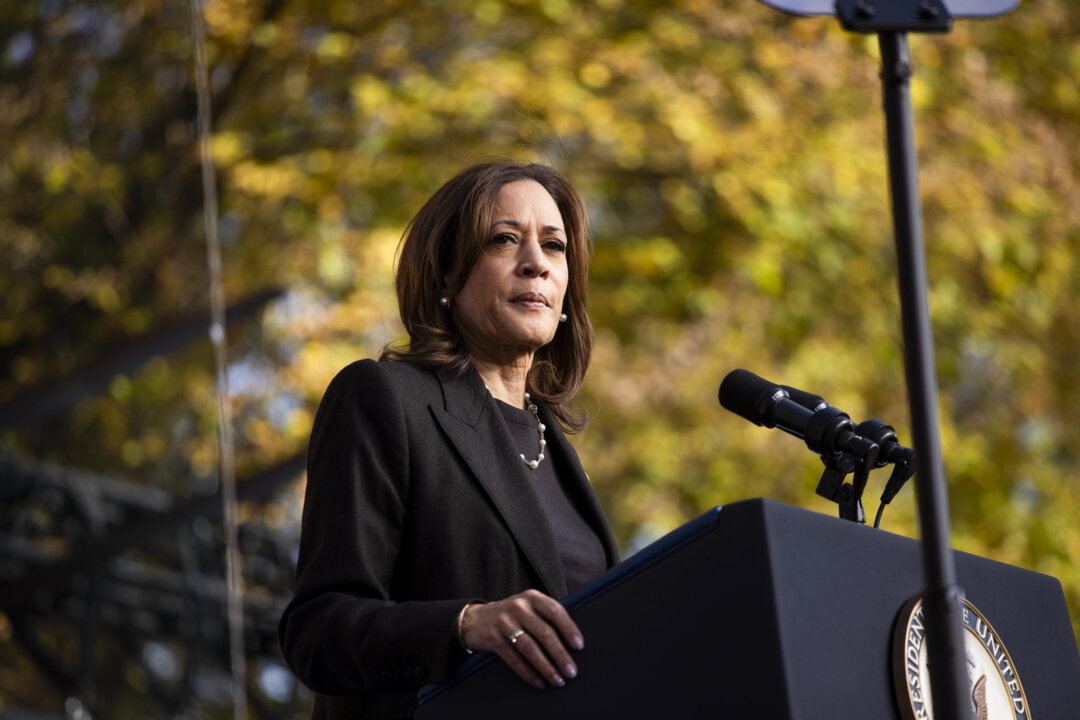‘It’s not the experience I’m having,’ she said.
Vice President Kamala Harris on Sunday dismissed a poll that suggests she has diminishing support among voting men, saying that her personal experience is different from what surveys say.
A poll from NBC released last week showed that former President Donald Trump has a 16-point lead over Harris among men, while the vice president has a 14-point lead among women. Similarly, an October New York Times poll put Harris ahead of Trump among women by 16 points, while the former president had an 11-point advantage among men.
Harris was questioned about the “widening gender gap” in recent polls by a reporter on Saturday: “Why do you think there is a disconnect for you with men right now?”
Harris responded, pointing to a crowd of supporters behind her, “You can look at the audience and see there are people of every background and gender who are showing up by the thousands. And I think it is because they know I intend to be a president for all Americans, and that’s how I’m campaigning to earn the vote of every American.”
When asked again about why there is a gender gap between each candidate, Harris said that it’s “not only about their gender” but it is also “about their geographic location and unburdened by who they voted for in the past.”
“It’s a time to put country before party” and “fight for what we care about,” she added.
When asked a third time about the polling numbers regarding male support, Harris said, “It’s not the experience I’m having.”
Previous polling suggests that the gender of their president isn’t a top priority for men or women, with men in particular seeing it as unimportant.
A Pew Research Center poll released last year asked Americans how important it is that a woman be elected president in their lifetime, and found that only 18 percent of U.S. adults said this is extremely or very important to them. Some 64 percent said it is not too important, not at all important, or that the president’s gender doesn’t matter.
The same poll showed that 73 percent of men and 57 percent of women said the issue was not too important, not at all important, or that the president’s gender doesn’t matter.
In 2020, women made up a bigger share of the electorate than men. According to AP VoteCast, a sweeping survey of that cycle’s voters, 53 percent of voters were women and 47 percent were men. And in that election, men were more likely to support Trump, while women voters were more likely to support President Joe Biden.
A few days ago, former President Barack Obama admonished black men who were reluctant to support Harris and said that he believes some aren’t backing her because she’s a woman.
Obama, who has emerged as a surrogate for Harris, said at an event in Pennsylvania on Oct. 10 that based on the “reports I’m getting from campaigns and communities, is that we have not yet seen the same kinds of energy and turnout in all quarters of our neighborhoods and communities as we saw when I was running.”
The 44th president then said that it “seems to be more pronounced with the brothers,” directing his remarks toward the black men.
“Part of it makes me think that, well, you just aren’t feeling the idea of having a woman as president, and you’re coming up with other alternatives and reasons for that,” Obama said.
On Oct. 15, in what appears to be a shift in her messaging toward men, Harris suggested she would look into having the government provide payments to the descendants of enslaved black people.
The idea of reparations to the descendants of slaves “has to be studied, there’s no question about that,” she told political pundit Lenard Larry McKelvey, who goes by the moniker Charlamagne tha God.
The Associated Press contributed to this report.

